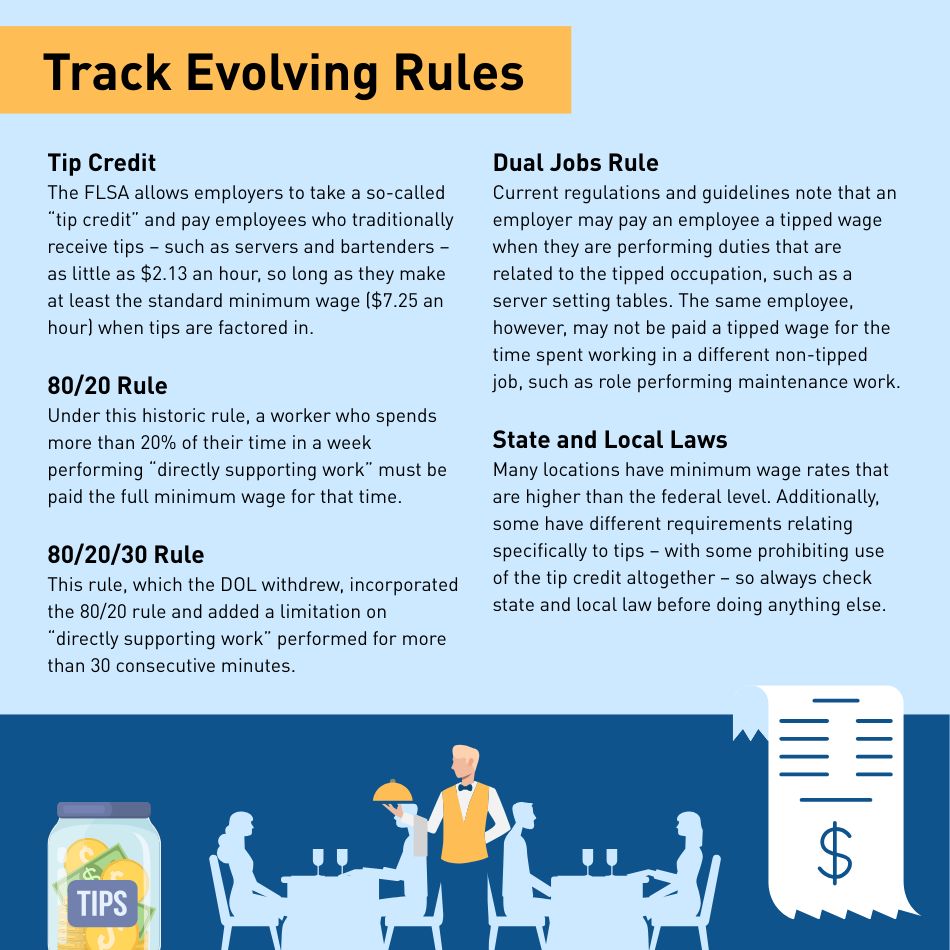Many employers in hospitality and other service industries take the tip credit toward their minimum wage obligation under federal wage and hour law – but complying with evolving rules has been challenging in recent years. When can tipped employees be paid a reduced minimum wage and when must they be paid the full minimum wage? How have rules, guidance, and interpretations from courts and the Department of Labor (DOL) changed in recent years? Here’s an update for employers and a five-step action plan for compliance.
What Happened?
Last August, the 5th U.S. Circuit Court of Appeals issued a momentous decision in the Restaurant Law Center v. DOL case that vacated the DOL’s infamous 80/20/30 rule. This was the agency-created rule that previously limited the types of job duties that tipped employees could perform and the amount of time that employees could perform those duties while being paid a tipped wage.
As a refresher: The FLSA allows employers to take a so-called “tip credit” and pay employees who traditionally receive tips – such as servers and bartenders – as little as $2.13 an hour, so long as they make at least the standard minimum wage ($7.25 an hour) when tips are factored in. The idea behind this practice is that these employees generally make the majority of their income through gratuities. But the 80/20/30 rule made it difficult for employers to use the tip credit under federal law.
Under the historic 80/20 rule, a worker who spends more than 20% of their time in a week performing non-tip-producing work must be paid the full minimum wage for that time. The 80/20/30 rule, which the Biden administration finalized the 2021, added a limitation on directly supporting work performed for more than 30 consecutive minutes.
Following the Restaurant Law Center decision vacating the 80/20/30 rule, the DOL withdrew the rule and updated its guidelines for investigators. Now, there is no longer any mention of either the original 80/20 rule or the more recent 80/20/30 rule in the FLSA regulations or guidelines.
Currently, both the regulations and guidelines note that an employer may pay an employee a tipped wage when the employee is performing duties that are related to the tipped occupation, such as a server setting tables, without any apparent time limitation. The same employee, however, may not be paid a tipped wage for the time spent working in a different non-tipped job, such as role performing maintenance work. The DOL’s field guidelines refer to this contrasting scenario as the “dual jobs” rule.
What Does This Mean for Employers?
For employers in Texas, Louisiana, and Mississippi – which are covered by the 5th Circuit’s ruling – it appears clear that both the 80/20 and 80/20/30 rules are dead, and employers must comply only with the Dual Jobs rule. These employers no longer have to meticulously track the amount of time tipped employees perform their various job duties, so long as the duties are part of their tipped occupation.
For employers outside the 5th Circuit, though, the picture is less clear. For example, some state laws impose their own version of the 80/20/30 rule. And other jurisdictions have legacy decisions from courts upholding the original 80/20 rule that have not yet been expressly overruled. In these jurisdictions, to be safe and as a best practice, employers should still comply with the original 80/20 rule until the relevant federal appeals court has an opportunity to review the issue in light of the Restaurant Law Center case (or the US Supreme Court rules otherwise).
Consider this example: Earlier this year a restaurant in Nebraska sought to dismiss a collective action lawsuit brought by a group of servers alleging a violation of the original 80/20 rule. The employer argued that this claim was no longer viable following the Restaurant Law Center decision. The Nebraska federal district court, however, denied the motion, finding (at least at the preliminary stage of litigation) that the Restaurant Law Center decision vacated only the 80/20/30 rule, not the original 80/20 rule. The court concluded that a 2011 decision from the 8th Circuit upholding the original 80/20 rule remained good law for now. So, for employers outside the 5th Circuit, this demonstrates the importance of knowing the status of the law on this issue in your particular jurisdiction.
What Should Employers Do Now? Here’s Your 5-Step Action Plan
- Don’t Forget to Provide Tip Credit Notices. While employers in the 5th Circuit may have more leeway, all employers that utilize the tip credit – regardless of location – risk losing it altogether if they do not provide proper notice to employees. Although not required, it is best practice to provide this notice to your tipped employees in writing and have them acknowledge receipt.
- Review State and Local Law. Many states (and some localities) have minimum wage rates that are higher than the federal level. Additionally, some states have different requirements relating specifically to tips – with some prohibiting use of the tip credit altogether – so always check state law before doing anything else.
- Evaluate Your Business Practices. For those employers that rely heavily on the tip credit, managing the process is key to avoiding compliance issues. Evaluate your business, consider the best practices and potential problem areas, and put a process in place to automatically manage potential issues. For example, some employers are shifting opening and closing duties to server assistants and hosts.
- Conduct Regular Training. Train managers on evolving rules relating to tipped employees.
- Track Updates from the New Administration. President Trump has already made big waves in the first 100 days of his second term – and we expect more workplace changes to come. Sign up to receive FP Insights on the latest developments.
Conclusion
If you have any doubt as to whether you are compliant with the applicable wage and hour rules, reach out to your Fisher Phillips attorney, the authors of this Insight, or any attorney on our Hospitality Industry Team or in our Wage and Hour Practice Group. Make sure you are subscribed to Fisher Phillips’ Insight System to get the most up-to-date information, as we will continue to monitor this situation and provide updates as appropriate.






